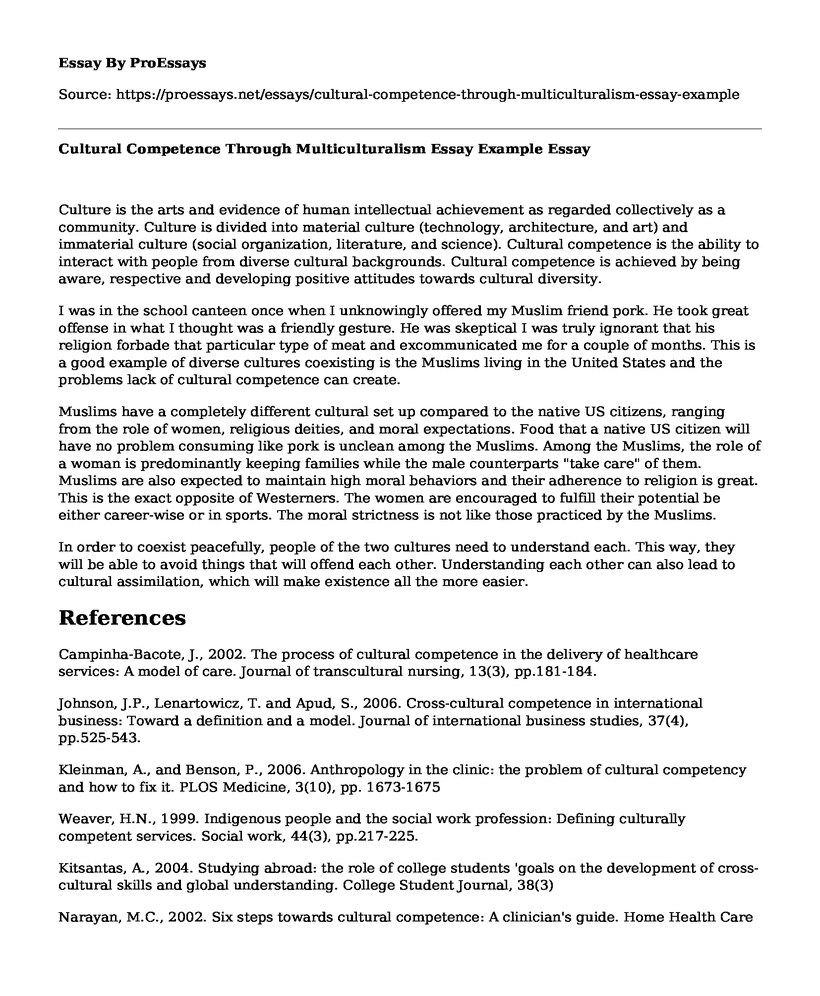Culture is the arts and evidence of human intellectual achievement as regarded collectively as a community. Culture is divided into material culture (technology, architecture, and art) and immaterial culture (social organization, literature, and science). Cultural competence is the ability to interact with people from diverse cultural backgrounds. Cultural competence is achieved by being aware, respective and developing positive attitudes towards cultural diversity.
I was in the school canteen once when I unknowingly offered my Muslim friend pork. He took great offense in what I thought was a friendly gesture. He was skeptical I was truly ignorant that his religion forbade that particular type of meat and excommunicated me for a couple of months. This is a good example of diverse cultures coexisting is the Muslims living in the United States and the problems lack of cultural competence can create.
Muslims have a completely different cultural set up compared to the native US citizens, ranging from the role of women, religious deities, and moral expectations. Food that a native US citizen will have no problem consuming like pork is unclean among the Muslims. Among the Muslims, the role of a woman is predominantly keeping families while the male counterparts "take care" of them. Muslims are also expected to maintain high moral behaviors and their adherence to religion is great. This is the exact opposite of Westerners. The women are encouraged to fulfill their potential be either career-wise or in sports. The moral strictness is not like those practiced by the Muslims.
In order to coexist peacefully, people of the two cultures need to understand each. This way, they will be able to avoid things that will offend each other. Understanding each other can also lead to cultural assimilation, which will make existence all the more easier.
References
Campinha-Bacote, J., 2002. The process of cultural competence in the delivery of healthcare services: A model of care. Journal of transcultural nursing, 13(3), pp.181-184.
Johnson, J.P., Lenartowicz, T. and Apud, S., 2006. Cross-cultural competence in international business: Toward a definition and a model. Journal of international business studies, 37(4), pp.525-543.
Kleinman, A., and Benson, P., 2006. Anthropology in the clinic: the problem of cultural competency and how to fix it. PLOS Medicine, 3(10), pp. 1673-1675
Weaver, H.N., 1999. Indigenous people and the social work profession: Defining culturally competent services. Social work, 44(3), pp.217-225.
Kitsantas, A., 2004. Studying abroad: the role of college students 'goals on the development of cross-cultural skills and global understanding. College Student Journal, 38(3)
Narayan, M.C., 2002. Six steps towards cultural competence: A clinician's guide. Home Health Care Management & Practice, 14(5), pp.378-386.
Taylor, R., 1998. Check your cultural competence. Nursing Management, 29(8), p.30.
Hays, P.A., 2009. Integrating evidence-based practice, cognitive-behavior therapy, and multicultural therapy: Ten steps for culturally competent practice. Professional Psychology: Research and Practice, 40(4), p.354.
Cite this page
Cultural Competence Through Multiculturalism Essay Example. (2022, May 26). Retrieved from https://proessays.net/essays/cultural-competence-through-multiculturalism-essay-example
If you are the original author of this essay and no longer wish to have it published on the ProEssays website, please click below to request its removal:
- The Contribution of Christian Worldview to Counseling Essay
- Essay Sample on Globalization, Immigration and Current US Administration
- Essay Sample on Government Intervention in the Economy
- Essay Example on Ronald Reagan's 1966 Campaign: Innovative Politics of the Future
- Essay Sample on Exploring the Balance Between Capitalism & Socialism in The United States
- Karl Marx: Capitalism, Labor & the Proletariat Revolution - Essay Sample
- Essay Example on Jesus of Nazareth: Son of God and 2nd Person of Trinity







